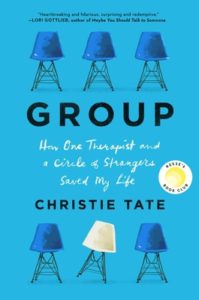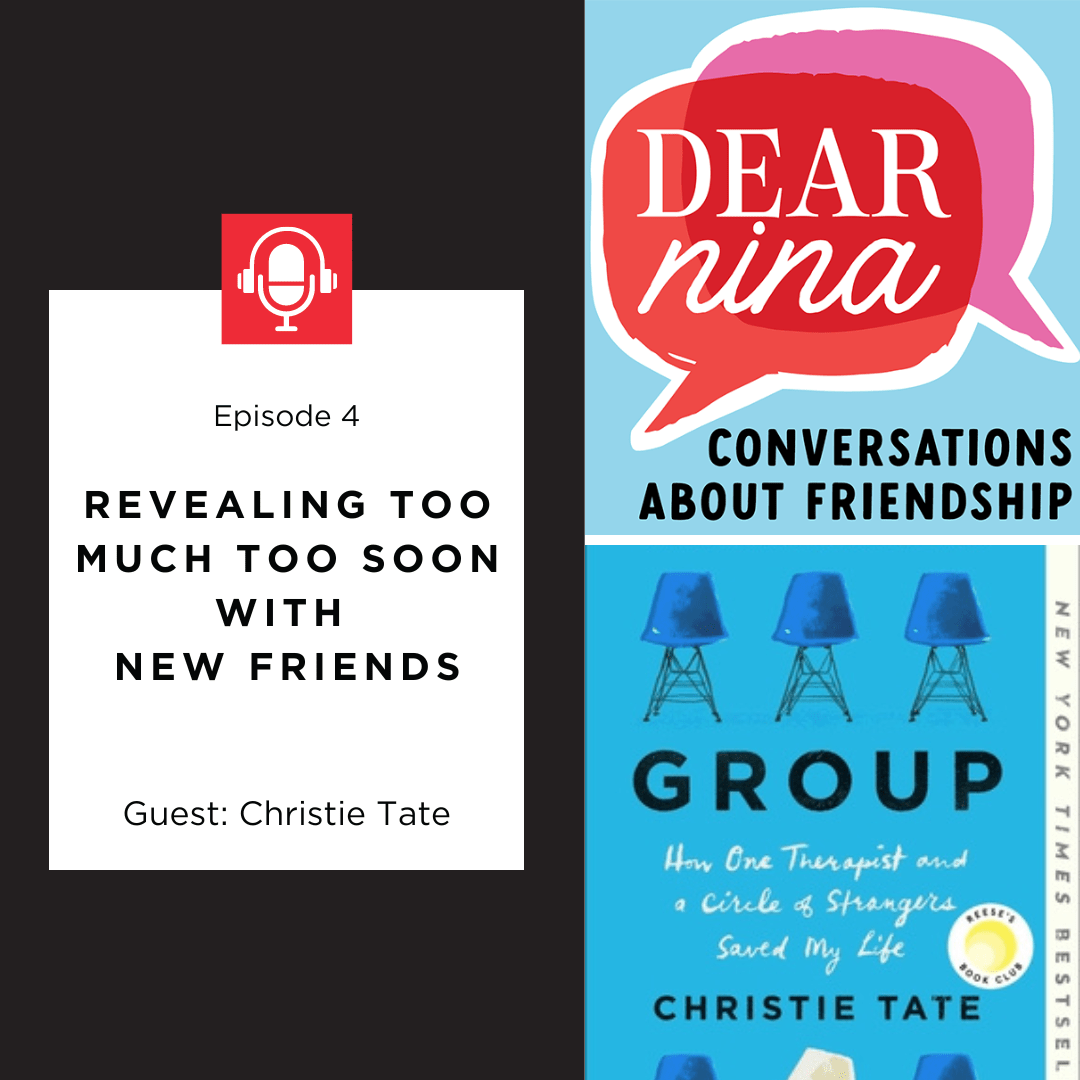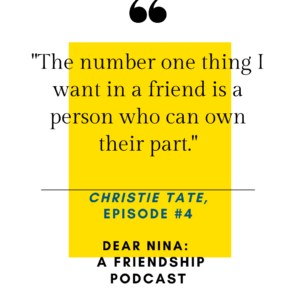Too Much Too Soon With New Friends
I welcomed Christie Tate, author of Group: How One Therapist And A Circle of Strangers Saved My Life, to answer an anonymous question about mental health and how much to reveal to a new friend. Christie and I discussed if you have what some might consider “extra baggage,” whether this is something you should tell a new friend right away. If not, when is the right time to share personal details that might scare away a new friend if told too soon?
You can listen to episode #4 below on APPLE PODCASTS, SPOTIFY, or anywhere you like to listen.
Meet Christie Tate, author of Group

Group was one of my favorite books of 2020. I bought it for my mom and several friends. I recommend it all the time, and I was also extremely excited when it came out because Christie and sort of knew each other online from what I call the literary blog world. And then before I knew it, she had this major book come out.
For any of my listeners who don’t know about Group, Christie summarizes it in the episode.
Here’s the question:
|
Dear Nina, I read your columns like an alien reads a road map. What do you tell a person who’s too cynical to try making new friends? I’ve been in therapy long enough to know my reasons for struggling in relationships—reasons that started early and contributed to my antisocial programming. I know that the answer is “you just have to try, it will be worth it”. But how do you hold on with new friends? How do you get through those cycles of closeness then separation without projecting some bad stuff on the other person and shutting it down? Should I warn someone I have mental health issues that have led to some big messes in relationships? The problem is, I’ve tried that and it feels like the person instantly moves me from potential friend to someone you treat with kid gloves. I don’t know, Nina. I feel all messed up and inadequate. I know that everyone feels this way, but what do you do if you really HAVE been an inadequate friend in the past and decided it’s not worth it to keep trying? Signed, Not Sure How Much To Reveal |
Notes From My Conversation With Christie
–Before we discussed the question about revealing information to friends, Christie and I spoke about her experience publishing such a personal book.
–We discussed how the letter writer feels like it’s a lose lose. It’s either be honest right away and hope you get a new friend’s understanding, patience, and compassion, but then risk driving the potential friend away. OR, not say anything and hope no issues come up, but once they inevitably do, there’s the fear that the new friend will feel duped or misled in some way. Christie had some helpful ideas about how to gage if the other person is open to honest information.
–One optimistic view I have of this question comes from many years of reading friendship emails in my inbox. I feel there’s hope because this letter writer isn’t blaming anyone else. Not that I want to see people filled with shame, but it doesn’t help to assume that your friendship struggles are everyone else’s problem either. Christie and I agreed that the letter writer would make a good friend and even if there has been issues in the past, we feel strongly that with a little more practice and an open heart, this letter writer can find one or two close friends, which is all the letter writer really needs!
BETTER FRIENDSHIP GOAL OF THE WEEK:
|
This week I suggested we try to actively remember that we never know what’s really going on in someone else’s life, that we don’t ever know what other people have on their plates. So if a friend seems curt or acts in a way that make us sigh or roll our eyes, we’re going to just say, “Who knows what this person has on their plate.” Easy enough right?
|
Buy, GROUP, everywhere books are sold. You can follow Christie on Instagram here.
Thank you to producer, Dave Dluger.
ASK AN ANONYMOUS QUESTION ANY TIME!
SEE PAST EPISODES WITH SHOW NOTES.
JOIN THE DEAR NINA FACEBOOK GROUP!
FOLLOW ALONG ON INSTAGRAM.
Links to Amazon are affiliate links
Latest posts by Nina Badzin (see all)
- #148 – Tricky Friendship Etiquette for the Modern Age - May 26, 2025
- Dear Nina on NPR - May 24, 2025
- #147 – Share Good News With Your Friends - May 20, 2025
- #146 – Tolerate Uncertainty & Stop the Overthinking Spiral in Your Friendships - May 13, 2025




4 Responses
This was a very honest kind conversation where the author is very sensitive to her own needs wanting to make a good impression.
I would think most of us set out to want this, too.
Kind of like first day of school or a new situation.
Your responses, Nina, are very kind and thoughtful.
Who doesn’t often ruminate after an occasion or rate themselves how they did; especially those of us who are introspective!
Then perhaps, n
Often next day, I would say I was probably good enough, not to overthink things and to go for it again if it feels right. People judge themselves just like we do!
We are way to hard on ourselves. Sometimes we feel it might be right to share with someone.
I would say after years of practice, it depends…but not right away till you get a feeling if this person is open enough, “trustworthy” of our confidence, as the author said, and would make you feel good.
Often I will not share what I’m going thru and am glad.
That often allows me to just be in the moment and get away from myself.
I end up being happy I didn’t.
We need to give ourselves breaks!
What a great comment. It’s so true that everyone is generally too hard on themselves. As the letter writer is nervous about new relationships, so too are other people often and I hate for that self-criticism to get in the way of new potential friendships.
Helpful episode!
So practical, realistic, doable. And compassionate. I really needed this.
Thanks!
I love this episode too. Christie is so honest and insightful, and her book was fantastic too.